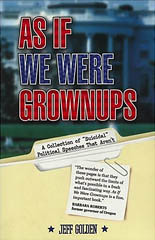I LOVE my friend Steve "Swami Beyondananda" Bhaerman's newsletter, Beyondanews. It's trenchant, smart and funny. In his latest issue he relates a story that I find barely believable...but believable. I figure if it's even one-quarter accurate, it has clues we'd better pay attention to.
It goes like this:
In her book, Not By the Sword, Kathryn Watterson tells the story of Michael Weisser, a Jewish cantor, and his wife Julie. They had just moved to their new home in Lincoln, Nebraska in June 1991, when their peaceful unpacking was interrupted by an ominous threatening phone call.
Shortly after, they received a package of racist flyers with a card announcing, "The KKK is watching you, scum." The Weissers called the police, who told them it looked like the work of one Larry Trapp, a self-described Nazi and Grand Dragon of the local Ku Klux Klan. Trapp, in fact, had been linked to fire bombings of African-American homes in the area and a center for Vietnamese refugees. The 44-year-old Trapp was wheelchair bound and suffering from diabetes, yet was a leader of the white supremacist movement in the area. At the time, he was making plans to bomb B'nai Jeshuran, the synagogue where Weisser was cantor.
Julie Weisser was frightened and even infuriated by the hate mail, but she also felt a spark of compassion for the man in the wheel chair who lived by himself in a one-room apartment. She decided to send Trapp a letter every day with passages from the Proverbs. When Michael saw that Trapp had launched a TV series spewing hatred on the local cable network, he called the Klan hotline and kept leaving messages: "Larry, why do you hate me? You don't even know me."
At one point, Trapp actually answered the phone and Michael, after identifying himself asked him if he needed a hand in doing his grocery shopping. Trapp refused -- politely -- but a process of rethinking began to stir in him. For a while he was two people -- the one still spewing hateful invective on TV, the other talking with Michael Weisser on the phone saying, "I can't help it. I've been talking like that all my life."
One night, Michael Weisser asked his congregation to pray for someone who is "sick from the illness of bigotry and hatred." That night, Trapp did something he'd never done before. The swastika rings he wore on both hands began to itch, so he took them off. The next day he called the Weissers and said, "I want to get out, but I don't know how." Michael suggested that he and Julie drive to Trapp's apartment so they could "break bread together." Trapp hesitated, then agreed.
At the apartment, Trapp broke into tears and handed the Weissers his swastika rings. In November, 1991 he resigned from the Klan, and later wrote apologies to those groups he had wronged. On New Year's Eve, Larry Trapp found out he had less than a year to live and that same night, the Weissers invited him to move in with them. Their living room became his bedroom and he told them, "You are doing for me what my parents should have done for me."
Bedridden, Trapp began to read about Gandhi and Martin Luther King, and learn about Judaism. On June 5, 1992 he converted to Judaism -- at the very synagogue he had once planned to blow up. Julie quit her job to care for him in his last days, and when Larry Trapp died on September 6th of that year, it was with Michael and Julie holding his hands.
This is one extraordinary story, perhaps the exception that proves the rule. I'm willing to bet there are thousands and thousands of other stories like this one. Remember, forgiveness doesn't excuse or condone a hateful, violent act. Rather, it releases us from what has been done to us, and frees our emotional energy to move life forward. This seemingly "selfless" act is actually quite selfish, only on a higher level.
Maybe, then, "higher selfishness" is the way of the future.
Wednesday, February 13, 2008
Sunday, February 3, 2008
A smart new use of citizen wisdom
There's a new project in Oregon that could be the prototype of a great TAB tool. It's called the Citizens Initiative Review (CIR) and it could help make direct democracy work better.
We're seriously attached to citizen ballot initiatives in Oregon as a way to reclaim some governing power. But they can be crude instruments, subject to a lot of deception, covert agendas and (supposedly) unforeseen consequences.
Can citizen-initiated lawmaking work more like it's supposed to? Here's a letter I just got that starts to explain CIR and the group behind it. See if you're intrigued by what they're up to.
We're seriously attached to citizen ballot initiatives in Oregon as a way to reclaim some governing power. But they can be crude instruments, subject to a lot of deception, covert agendas and (supposedly) unforeseen consequences.
Can citizen-initiated lawmaking work more like it's supposed to? Here's a letter I just got that starts to explain CIR and the group behind it. See if you're intrigued by what they're up to.
Subscribe to:
Posts (Atom)

